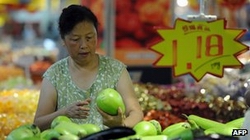 China's annual inflation jumped to a 10-month high in February as holiday spending for the Lunar New Year drove food prices sharply higher, data from the National Bureau of Statistics (NBS) showed on Saturday.
China's annual inflation jumped to a 10-month high in February as holiday spending for the Lunar New Year drove food prices sharply higher, data from the National Bureau of Statistics (NBS) showed on Saturday.China's consumer price index rose 3.2 percent in February versus a year ago, ahead of market expectations in the benchmark Reuters poll of a rise of 3.0 percent, with food prices leaping 6.0 percent on a year ago - a nine-month high.
The month-on-month rise in CPI was also ahead of consensus, with the 1.1 percent increase the strongest monthly gain since January 2012's rise of 1.5 percent. Economists polled by Reuters had expected a 0.8 percent rise.
The sharp rise in food prices underlined that seasonal distortions caused by the timing of Lunar New Year festivities - which were in February this year and in January in 2012 - were key drivers of the headline annual rise in prices.
"Going into March, with the Lunar New Year impact fading and weather turning better, all conditions become favourable for food production and transportation and March CPI is expected to ease from February," Yu Qiumei, a senior NBS statistician, said in a statement accompanying the data.
Policymakers are already braced for higher prices this year versus last. Inflation is likely to hit 3.5 percent in 2013, according to targets announced at the opening of China's annual legislative meeting on Tuesday. Inflation in 2012 was 2.6 percent.
The 2013 projection, however, is 50 basis points below the 4 percent inflation that had been factored into the government's 2012 economic forecasts, suggesting that inflation is seen to be relatively well-contained - either by existing policy settings or the relative slackness in the world's second-biggest economy.
China's GDP grew at its slowest rate in 13 years in 2012.
ECONOMY STABILISING
An economic recovery that started in the fourth quarter last year is viewed by analysts as a mild one engineered to ensure stability during the first year of a new government headed by Xi Jinping and Li Keqiang, who are in the final formal stages of taking over from outgoing President Hu Jintao and Premier Wen Jiabao. That is due to be completed by March 17.
"This pickup should have enough momentum to buoy growth for at least the first half of 2013, which will allow China's new leaders to take office against a more optimistic backdrop of rising business confidence," Andrew Batson, research director at consultancy GK Dragonomics wrote in a note to clients.
Producer price data reflected the still mild nature of the recovery, with prices at China's factory gates falling 1.6 percent in February from the year before, compared with a 1.6 percent drop in January.
Month-on-month, factory gate prices rose 0.2 percent in a sign that pricing in China's industrial sector is stabilising as a recovery in the world's No.2 economy gathers pace.
A better sense of broad recovery momentum should come later on Saturday when data for industrial output, fixed asset investment and retail sales is published.
Chinese trade data on Friday underlined the uneven path of the recovery, as exports soared past forecasts to jump by a fifth in February from a year ago, while imports were surprisingly weak, falling at their fastest pace in 13 months.







